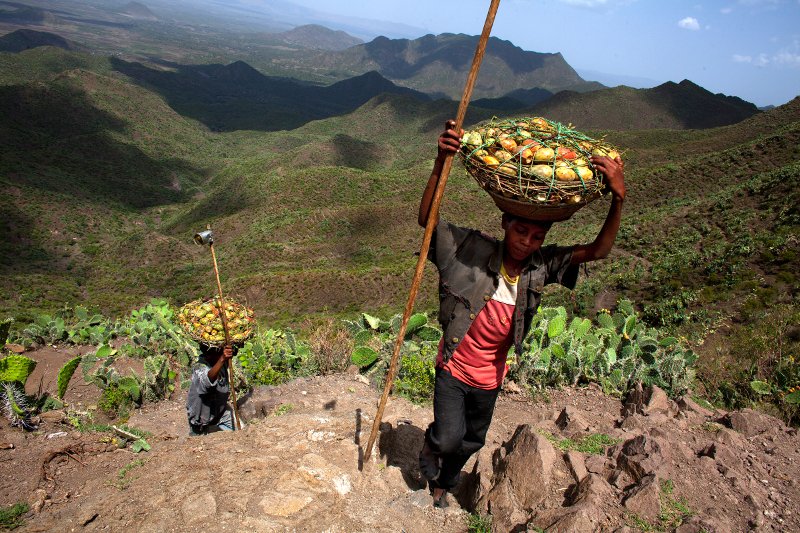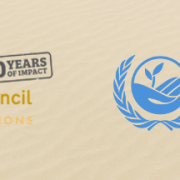Future Policy Award crowns the World’s Best Land Restoration Policies
Ethiopia wins Gold Award │ Other winning policies from China, Brazil and Jordan
Hamburg / Bonn / Ordos, 22nd August 2017: More people, less erosion – Ethiopia’s Tigray region demonstrates that this can be a reality: They will take home the Gold Future Policy Award 2017, beating 26 other nominated policies to the prize. Also known as “Oscar for Best Policies”, the Future Policy Award highlights the world’s best policies that combat desertification and land degradation this year. With unique collective action, voluntary labour and the involvement of youth, the people of Tigray are restoring land on a massive scale. As a result, erosion has decreased significantly, groundwater levels are recharged, and the uptake of sustainable agricultural practices made a significant contribution to food self-sufficiency and economic growth.

Photo by TerrAfrica Partnership at NEPAD Agency
Two Silver Awards were granted to:
- Brazil’s Cistern Programme, which empowered millions of the country’s poorest people by building 2 million cisterns in the Semiarid region and providing water for consumption and for growing food and keeping livestock
- China’s Law on Prevention and Control of Desertification, the world’s first integrated law dedicated to combating desertification. Over the last 15 years, China has reversed the trend of desertification.
The Vision Award goes to the international “4 per 1000” Initiative which communicates a new concept for mitigating climate change through the increase of soil organic carbon.
The international jury further bestowed Bronze Awards to:
- Australia’s Indigenous Protected Areas and Rangers Programmes, where more than 2,600 indigenous rangers are at the forefront of tackling environmental degradation
- Jordan’s Updated Rangeland Strategy, which is enshrining the Middle East’s most widespread and longstanding indigenous traditional conservation institution ‘Hima’ into law
- Niger’s large-scale, cross-sectoral 3N Initiative ‘Nigeriens Nourishing Nigeriens’ addressing land degradation and food security.
Statements from the UNCCD and the World Future Council
Monique Barbut, Under-Secretary-General of the United Nations and Executive Secretary of the United Nations Convention to Combat Desertification (UNCCD):
“Drylands cover close to 40% of the Earth’s land surface. Hundreds of millions of people are directly threatened by land degradation and climate change is only going to intensify the problem. So far, this underestimated environmental disaster has received far too little attention. The Future Policy Award 2017 is turning the spotlight on the looming environmental challenge and effective responses. The seven Future Policy Awardees are all from affected countries, and demonstrate great environmental and political determination.”
Alexandra Wandel, Director of the World Future Council (WFC):
“The Ethiopian Tigray Region’s win of the Gold Future Policy Award is sending a strong, empowering message: they show how a small region in a climate vulnerable country can find a smart and highly effective way to successfully address a global challenge. This is placing Ethiopia firmly on the map as an environmental leader.”
The Future Policy Award is the only award which honours policies rather than people on an international level. Each year, the World Future Council chooses a topic for the Future Policy Award on which policy progress is particularly urgent. In 2017, in partnership with the United Nations Convention to Combat Desertification (UNCCD), laws and policies were evaluated that contribute to the protection of life and livelihoods in the drylands, and help achieve Sustainable Development Goal 15, target 3, to “combat desertification, restore degraded land and soil, including land affected by desertification, drought and floods, and strive to achieve a land degradation-neutral world.” The Awards will be presented at a ceremony in September 2017, at the thirteenth session of the Conference of the Parties of the UNCCD in Ordos, China.
For more information, please visit
https://www.worldfuturecouncil.org/future-policy-award/
https://www.worldfuturecouncil.org/p/2017-desertification/
http://www.futurepolicy.org/
Follow the 2017 Future Policy Award on Twitter with #FPA2017
Read this Press Release in other languages
Media contact
Media Contact
Miriam Petersen
Media and Communications Manager
World Future Council
Dorotheenstr. 15, 22301 Hamburg, Germany
Email: miriam.petersen@worldfuturecouncil.org
Phone: 01781018019
www.worldfuturecouncil.org
About the World Future Council
The World Future Council (WFC) consists of up to 50 eminent global changemakers from governments, parliaments, civil society, academia, the arts, and business who have already successfully created change. We work to pass on a healthy planet and fair societies to our children and grandchildren. To achieve this, we focus on identifying and spreading effective, future just policy solutions and promote their implementation worldwide. Jakob von Uexkull, the Founder of the Alternative Nobel Prize, launched the World Future Council in 2007. We are an independent, non-profit organization under German law and finance our activities from donations. For information visit www.worldfuturecouncil.org
[/av_one_full]
The United Nations Convention to Combat Desertification (UNCCD) is the only legally binding international agreement on land issues. The Convention promotes good land stewardship. Its 196 Parties aim, through partnerships, to implement the Convention and achieve the Sustainable Development Goals. The end goal is to protect our land, from over-use and drought, so it can continue to provide us all with food, water and energy. By sustainably managing land and striving to achieve land degradation neutrality, now and in the future, we will reduce the impact of climate change, avoid conflict over natural resources and help communities to thrive.The United Nations Convention to Combat Desertification

